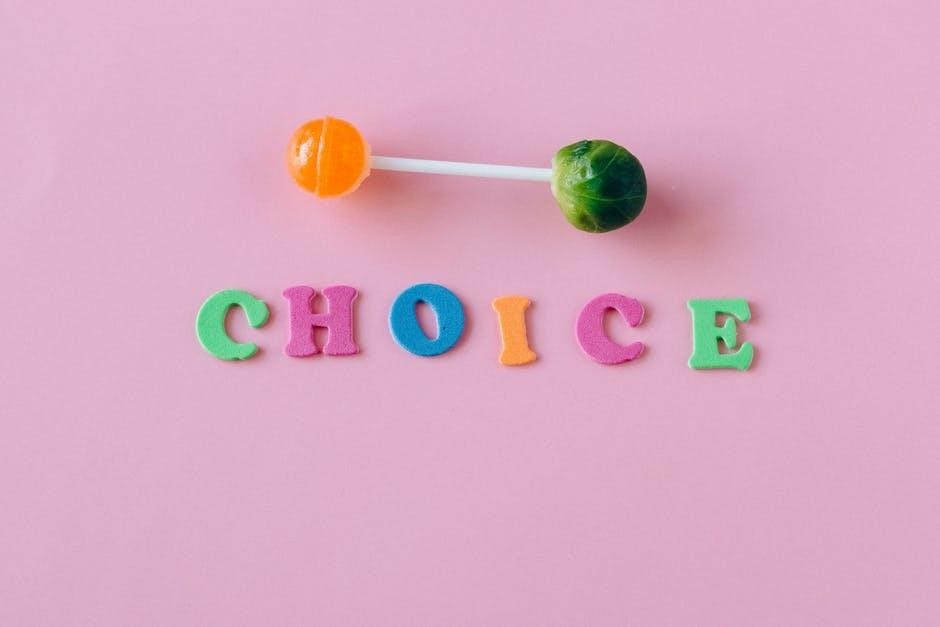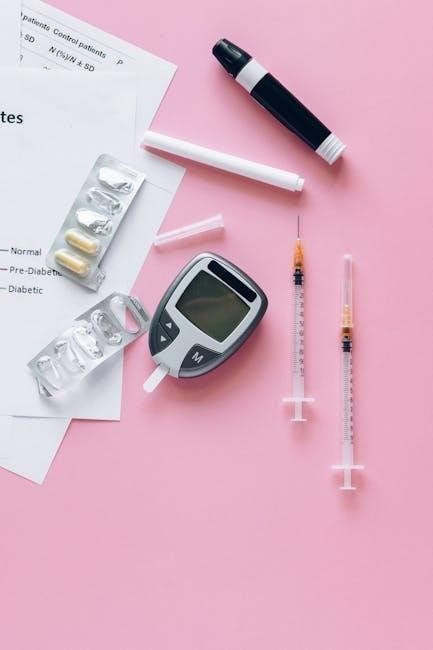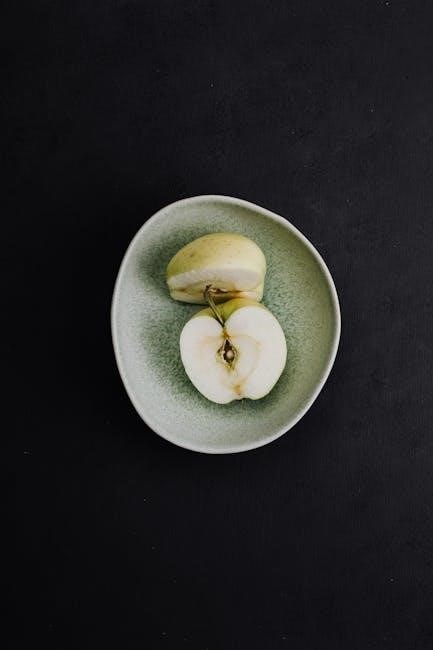
blood type b negative diet food list pdf
Discover the ultimate Blood Type B Negative diet food list in PDF. Learn which foods to eat for optimal health and weight loss. Download now!
The Blood Type B Negative diet focuses on lean proteins, fruits, and vegetables, avoiding certain foods to maintain health and prevent chronic conditions, based on Dr. Peter D’Adamo’s research.
Overview of the Blood Type Diet Concept
The Blood Type Diet, developed by Dr. Peter D’Adamo, suggests that individuals with different blood types (A, B, AB, O) should eat specific foods to optimize health. It is based on the idea that blood type antigens influence how the body reacts to certain foods. For Blood Type B, the diet emphasizes lean meats, dairy, and certain vegetables while avoiding foods like corn and wheat. The concept aims to improve digestion, energy, and overall well-being by aligning diet with genetic makeup, though its scientific validity remains debated.
Importance of Tailoring Your Diet to Blood Type B Negative
Tailoring your diet to Blood Type B Negative can enhance digestion, reduce autoimmune risks, and improve overall health. By focusing on beneficial foods like lean meats, dairy, and specific vegetables, individuals can avoid adverse reactions. This personalized approach helps prevent weight gain and boosts energy levels, aligning with genetic predispositions for optimal well-being. Adherence to the diet may also minimize chronic disease risks, though it’s essential to balance with professional medical advice for personalized health management.

Beneficial Foods for Blood Type B Negative
Tailoring your diet to Blood Type B Negative enhances digestion and reduces autoimmune risks by focusing on beneficial foods like lean meats, dairy, and specific vegetables. This approach prevents weight gain and boosts energy by aligning with genetic predispositions, minimizing chronic disease risks. Professional medical advice is essential for personalized health management, ensuring the diet is adapted effectively to individual needs and promoting long-term well-being.
Meat, Poultry, and Seafood Recommendations
For Blood Type B Negative, lean meats like lamb, mutton, and rabbit are highly beneficial. Poultry such as turkey and chicken are also suitable in moderation. Seafood options include cod, flounder, and carp; Avoid processed meats like bacon and ham, as well as pork and duck, which can trigger adverse reactions. Fresh, organic choices are preferred to maximize nutritional benefits and support overall health. Balance these proteins with vegetables and grains for a well-rounded diet.
- Lamb
- Mutton
- Rabbit
- Turkey
- Cod
- Flounder
Dairy and Egg Options
Dairy products are highly beneficial for Blood Type B Negative individuals. Cottage cheese, feta, goat cheese, and butter are excellent choices. Eggs are also suitable and can be consumed regularly. These foods provide essential nutrients and support digestive health. Avoid overly processed or high-fat dairy products to maintain optimal benefits. Incorporating moderate portions of these items helps balance the diet and satisfies nutritional needs effectively.
- Cottage cheese
- Feta
- Goat cheese
- Eggs
- Butter
Vegetables and Fruits
Blood Type B Negative individuals benefit from a variety of vegetables and fruits that support overall health. Broccoli, carrots, beets, and cabbage are highly recommended, while apples, bananas, and grapes are excellent fruit choices. These foods promote digestion and provide essential vitamins and minerals. Avoiding certain vegetables like corn and wheat ensures optimal compatibility with the diet.
- Broccoli
- Carrots
- Beets
- Cabbage
- Apples
- Bananas
- Grapes

Grains and Legumes

For Blood Type B Negative, compatible grains include oats, quinoa, basmati rice, and brown rice, which support digestion and energy. Legumes like lentils and chickpeas are beneficial, while soybeans and black beans should be avoided. These choices help maintain metabolic balance and overall health without causing adverse reactions.
- Oats
- Quinoa
- Basmati rice
- Lentils
- Chickpeas

Foods to Avoid for Blood Type B Negative
Certain foods can trigger negative reactions in Blood Type B Negative individuals. Avoiding meats like chicken, duck, and pork, along with dairy products like cheese and butter, and grains such as wheat and barley, helps prevent health complications and supports optimal well-being.

Meat, Poultry, and Seafood to Limit or Avoid
Individuals with Blood Type B Negative should avoid certain meats, poultry, and seafood to prevent negative reactions. Foods like chicken, duck, and pork, as well as seafood such as caviar, shark, and carp, should be limited or avoided. Additionally, processed meats like bacon and ham can trigger adverse effects. Dairy products, especially cheese and butter, should also be minimized to maintain optimal health and prevent potential autoimmune issues associated with this blood type.
Dairy and Grains to Exclude
For Blood Type B Negative individuals, certain dairy products and grains should be excluded to avoid negative health effects. High-fat dairy, such as cheese and butter, should be limited, as they can trigger inflammation. Grains like wheat, corn, and processed cereals are also best avoided, as they may hinder digestion and energy levels. Additionally, refined carbohydrates and gluten-containing products can disrupt metabolic balance. Opting for lean dairy alternatives and gluten-free, whole-grain options is recommended to maintain overall well-being and align with dietary guidelines.
Vegetables and Fruits to Minimize
For Blood Type B Negative individuals, certain vegetables and fruits should be minimized to avoid adverse health effects. Corn, wheat, and processed vegetables like canned goods can cause inflammation and digestive issues. Fruits high in sugar, such as mangoes and bananas, should be consumed in moderation to prevent blood sugar spikes. Additionally, fruits like tomatoes and avocados may trigger immune responses in some individuals. Opting for fresh, low-sugar fruits and non-inflammatory vegetables is key to maintaining balance and overall health.

Tips for Grocery Shopping and Meal Planning
Plan meals weekly, use a Blood Type B Negative food list PDF, and organize groceries to ensure adherence to the diet, promoting long-term health and convenience.
Creating a Blood Type B Negative Food List PDF
Developing a Blood Type B Negative food list PDF simplifies grocery shopping and meal planning. Include beneficial foods like lamb, cod, and specific dairy products, while excluding corn and wheat. Organize the list by categories—meat, seafood, dairy, vegetables, and grains—for easy reference. Use checklists or bold formatting to highlight highly beneficial options. Ensure the PDF is portable and regularly updated to reflect dietary needs and preferences, making it a handy resource for maintaining the Blood Type B Negative diet effectively.

Practical Meal Ideas
Start your day with scrambled eggs, spinach, and a slice of toast made from spelt flour. For lunch, try grilled lamb or cod paired with steamed vegetables like broccoli and carrots. Incorporate quinoa or brown rice as a side. Snack on mixed berries or a handful of almonds. Dinner could feature roasted turkey with sautéed kale and sweet potatoes. Use herbs like turmeric and parsley for seasoning. These meals align with the Blood Type B Negative diet, promoting balance and energy while adhering to recommended food lists.

Scientific Perspective and Criticisms
The Blood Type B Negative diet lacks comprehensive scientific support, with critics arguing its recommendations are based on anecdotal evidence rather than rigorous clinical studies.
Research on the Blood Type Diet
Research on the Blood Type Diet, including Blood Type B Negative, is limited, with few rigorous clinical trials. Dr. Peter D’Adamo’s theory suggests specific foods interact with blood antigens, but critics argue the evidence is anecdotal. Some studies suggest potential benefits for weight loss and improved digestion, but no conclusive proof links the diet to long-term health outcomes. The scientific community remains divided, with many experts calling for more robust research to validate its claims.
Criticisms and Controversies
The Blood Type Diet, including the B Negative plan, has faced criticism for lacking robust scientific evidence. Critics argue that the diet’s benefits are anecdotal and not supported by large-scale clinical trials. Some experts view it as overly restrictive, suggesting it may lead to nutritional deficiencies if followed strictly. Others question its universal applicability, as individual responses to food vary widely. Despite its popularity, the diet remains controversial, with many health professionals recommending more flexible, evidence-based approaches to nutrition.
The Blood Type B Negative diet emphasizes balanced nutrition, focusing on lean proteins, vegetables, and fruits while avoiding harmful foods. While some find it beneficial, others remain skeptical due to limited scientific evidence supporting its claims. Further research is needed to validate its long-term benefits and universal applicability.

Final Thoughts on the Blood Type B Negative Diet
Adopting the Blood Type B Negative diet involves careful food selection to enhance health and energy. While promising for some, it lacks robust scientific backing. Critics argue that individual variability may limit its effectiveness, and more research is needed to confirm its benefits. Those considering this diet should consult a healthcare provider to ensure it aligns with their personal health needs and lifestyle. Balancing nutrition and moderation is key to any dietary approach.
Resources for Further Reading
For deeper insights, explore Dr. Peter D’Adamo’s book, Eating Right for Your Blood Type, which outlines tailored dietary plans. Additionally, downloadable PDF guides like the Blood Type B Negative Food List offer convenient meal planning. Websites and health portals provide detailed charts, recipe ideas, and scientific discussions on the diet’s effectiveness. These resources help individuals customize their approach and stay informed about the latest research and practical applications of the Blood Type B Negative diet.